Can machines ever honestly think? Dive into the labyrinth of human cognition and artificial intelligence—where biology meets binary, and ethics collide with efficiency.
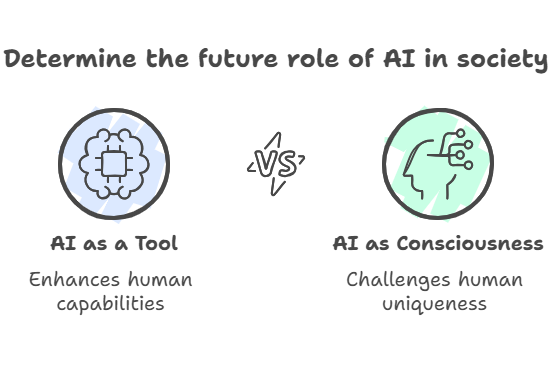
Table of Contents
- The Great Cognitive Divide
- Human Intelligence: The Chaotic Symphony of Mind
- 2.1 The Enigma of Cognition
- 2.2 Emotions: The Unquantifiable Variable
- 2.3 Adaptability: Evolution’s Masterstroke
- Artificial Intelligence: The Cold Precision of Silicon
- 3.1 The Illusion of Thought
- 3.2 Narrow vs. General AI: The Eternal Debate
- 3.3 Machine Learning: The Art of Statistical Mimicry
- The Chasm Between Flesh and Code
- 4.1 Processing: Intuition vs. Computation
- 4.2 Decisions: Morality vs. Optimization
- 4.3 Ethics: The Human Burden
- Where Minds and Machines Collide
- 5.1 Healthcare: Diagnoses with and without Empathy
- 5.2 Education: Tutors vs. Algorithms
- 5.3 Business: The Rise of the Corporate Cyborg
- The Future: Coexistence or Conquest?
- 6.1 Augmented Intelligence: The Best of Both?
- 6.2 The Ethical Quagmire
- Conclusion: Who Wins the War of Wits?
The Great Cognitive Divide
The battle between humans and artificial intelligence represents one of the most profound philosophical dilemmas of our technological age. This isn’t merely a comparison of processing speeds or memory capacities – it’s a fundamental examination of what it means to be intelligent, to be conscious, to be alive. On one side stands biological intelligence, forged through billions of years of evolutionary trial and error, messy and magnificent in its imperfections. On the other, artificial intelligence emerges as humanity’s most ambitious mirror, reflecting both our brilliance and our limitations in cold, unfeeling code.
The implications of this divide extend far beyond academic curiosity. As AI systems increasingly mediate our relationships, influence our decisions, and shape our societies, understanding the nature of this intelligence gap becomes crucial. Will artificial intelligence remain a tool, or could it someday become something more? Can silicon ever truly replicate the miracle of human consciousness? These questions haunt laboratories and think tanks across the globe, as we stand at the precipice of what may be the most significant cognitive revolution since the dawn of human thought.
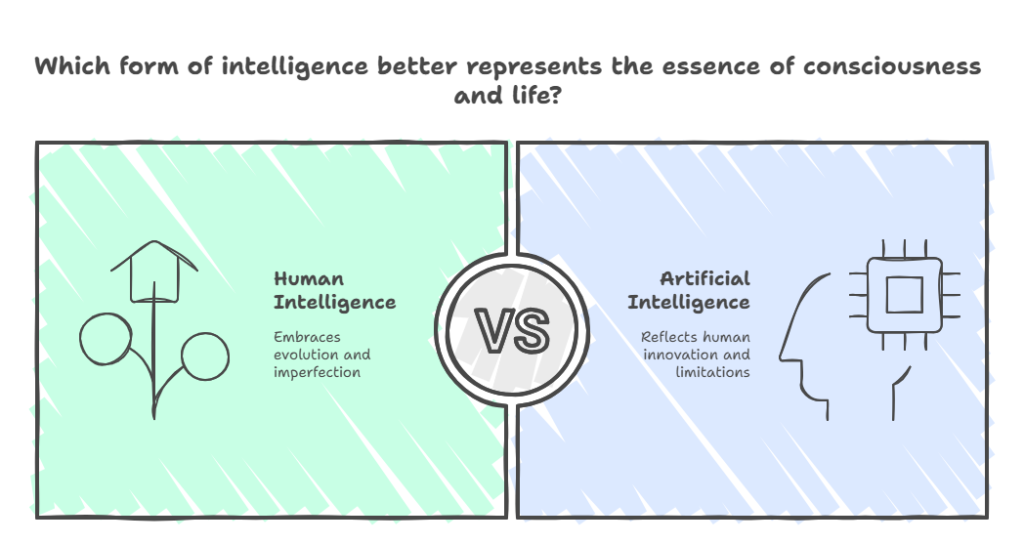
Human Intelligence: The Chaotic Symphony of Mind
2.1 The Enigma of Cognition
Human cognition operates on principles that continue to baffle even our most advanced neuroscientists. Unlike the orderly procession of algorithmic operations, human thought resembles more a jazz improvisation than a symphony – unpredictable, emotional, and breathtakingly creative. Our brains don’t process information so much as they interpret, contextualize, and reimagine it through the kaleidoscope of personal experience.
Consider the miracle of human attention: simultaneously fragile and powerful. We can lose focus because of a buzzing fly, yet enter states of hyperfocus where hours disappear in creative flow. Our memory doesn’t record events with digital precision, but reconstructs them anew each time, colored by emotion and subsequent experiences. This reconstructive nature makes our recall imperfect, yet allows for the creative recombination of ideas that fuels innovation.
The human mind operates on multiple levels of consciousness simultaneously. While we focus on a conversation, subconscious processes monitor our environment for threats, regulate bodily functions, and even work on problems in the background. This parallel processing gives rise to those magical “aha” moments when solutions appear seemingly from nowhere – a phenomenon no AI has yet replicated.
2.2 Emotions: The Unquantifiable Variable
Emotional intelligence represents perhaps the most profound chasm between human and artificial cognition. Our decisions are never purely rational, but suffused with feelings that color every perception and choice. This emotional layer creates both our greatest weaknesses and our most extraordinary strengths.
The human capacity for empathy – to literally feel with another being – enables social bonds that form the foundation of civilization. When we comfort a grieving friend, negotiate a business deal, or fall in love, we’re engaging in cognitive processes that integrate logic with deep emotional intelligence. The subtle dance of microexpressions, tone, and context that humans navigate effortlessly remains largely impenetrable to even our most advanced AI systems.
Moreover, emotions drive human creativity in ways that defy algorithmic replication. The anguish that produces great art, the joy that sparks scientific curiosity, the love that motivates sacrifice – these are not bugs in our cognitive system, but features that have propelled our species’ development. An AI might analyze every painting Van Gogh ever created, but could it ever feel the desperate need to express inner turmoil through brushstrokes?
2.3 Adaptability: Evolution’s Masterstroke
Human intelligence shines brightest in novel situations. Faced with completely unexpected challenges, humans can improvise solutions using analogical reasoning, intuition, and sheer creative desperation. This adaptability stems from millions of years of evolutionary pressure that favored cognitive flexibility over specialized prowess.
A child needs only a few examples to learn concepts that would require massive training datasets for an AI. Humans can learn from single experiences (“Don’t touch the hot stove”), while AI requires thousands of similar cases to achieve comparable understanding. Our brains seamlessly transfer knowledge across domains – understanding that principles learned in sports might apply to business strategy, for instance.
This generalizability extends to physical adaptability as well. The same human brain can learn to pilot aircraft, perform surgery, compose music, and navigate complex social hierarchies – often within a single lifetime. No current AI system approaches this level of versatile intelligence; each must be painstakingly trained for specific domains.
The human capacity for metacognition – thinking about thinking – adds another layer of adaptability. We can recognize our own cognitive biases (even if we don’t always overcome them), consciously alter our learning strategies, and intentionally develop new skills. This self-modifying capability remains one of the most challenging frontiers for AI research.
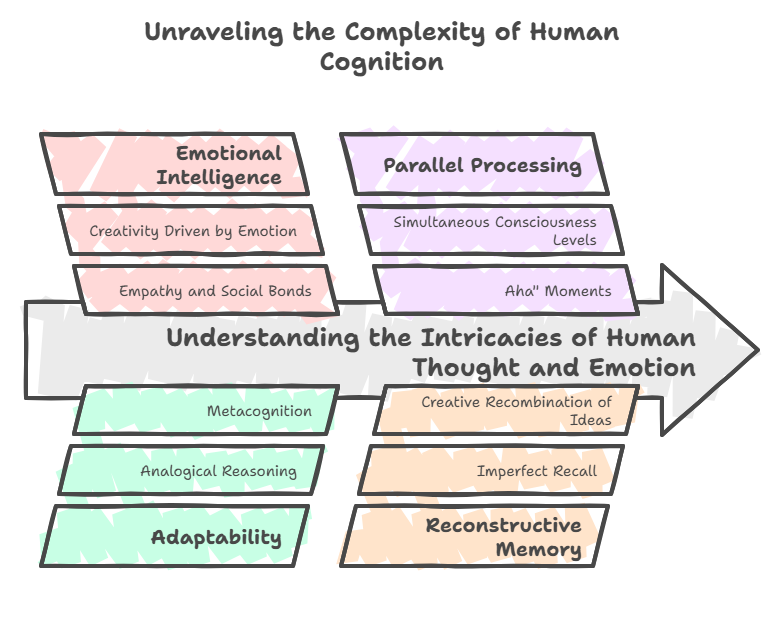
Artificial Intelligence: The Architecture of Synthetic Thought
3.1 The Illusion of Consciousness
Artificial intelligence operates on an entirely different paradigm than biological cognition. Where human thought emerges from the wetware of 86 billion interconnected neurons, AI springs from mathematical abstractions—algorithms processing vectors in high-dimensional spaces. The most advanced neural networks today simulate a crude approximation of how we believe brains might work, yet they lack any true understanding, any spark of awareness.
An AI doesn’t know anything in the human sense. It calculates. It optimizes. It predicts. When ChatGPT generates poetry, it isn’t expressing emotion—it’s statistically predicting which words should follow others based on patterns in its training data. This distinction is crucial: AI doesn’t experience; it simulates.
Yet the simulation grows increasingly convincing. Large language models (LLMs) can now debate philosophy, write code, and even mimic human conversational quirks—pauses, humor, rhetorical questions. This has led some to speculate: if an AI acts intelligent, does the distinction between simulation and reality even matter?
3.2 Narrow AI vs. General AI: The Grand Delusion
Narrow AI: Master of One, Fool of All
Today’s AI systems are specialists. AlphaGo dominates at Go but can’t play chess. GPT-4 writes essays but can’t drive a car. These narrow AIs excel within rigidly defined domains but fail spectacularly outside them. They are savants—brilliant at their single task, utterly helpless elsewhere.
Artificial General Intelligence (AGI): The Mythical Beast
AGI—the dream of an AI that can reason across any domain as fluidly as a human—remains theoretical. We don’t know if it’s possible. Some argue true AGI would require consciousness (which we can’t even define, let alone engineer). Others believe we’ll brute-force it with ever-larger models.
The implications of achieving AGI are staggering:
- Autonomous scientists could accelerate discovery beyond human limits
- Self-improving code leading to an “intelligence explosion”
- Existential risks if such an entity’s goals misalign with humanity’s
We stand at the edge of this unknown, unsure whether AGI is decades away—or impossible.
3.3 Machine Learning: The Alchemy of Data
Modern AI doesn’t follow explicit programming. Instead, it learns from data through three primary paradigms:
Supervised Learning: The Student with a Textbook
- Trained on labeled datasets (e.g., “this image contains a cat”)
- Excellent for classification tasks (spam detection, medical imaging)
- Limited by the quality and bias of its training data
Unsupervised Learning: The Curious Explorer
- Finds hidden patterns in unlabeled data
- Powers recommendation systems (Netflix, Amazon)
- Can reveal unexpected correlations (or spurious ones)
Reinforcement Learning: The Trial-and-Error Gambler
- Learns through rewards/punishments (like a dog being trained)
- Behind AlphaGo, self-driving car algorithms
- Dangerously opaque—we often don’t know why it makes certain decisions
The “black box” problem looms large: even AI’s creators often can’t explain why their models behave as they do.
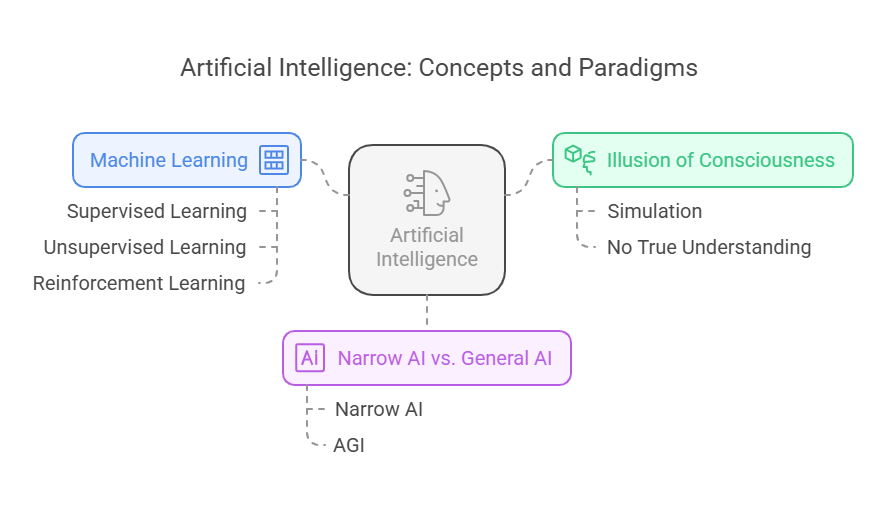
The Chasm Between Flesh and Code
4.1 Processing: Intuition vs. Computation
| Human Cognition | AI Processing |
|---|---|
| Slow (200mph neural signals) | Lightning-fast (nanosecond ops) |
| Parallel & distributed | Sequential (despite parallelism) |
| Energy-efficient (~20W) | Power-hungry (megawatts for LLMs) |
| Contextually flexible | Data-domain constrained |
Humans grasp meaning through lived experience—we understand that a “broken heart” isn’t a cardiac condition. AI, lacking embodiment, struggles with such metaphors unless explicitly trained on them.
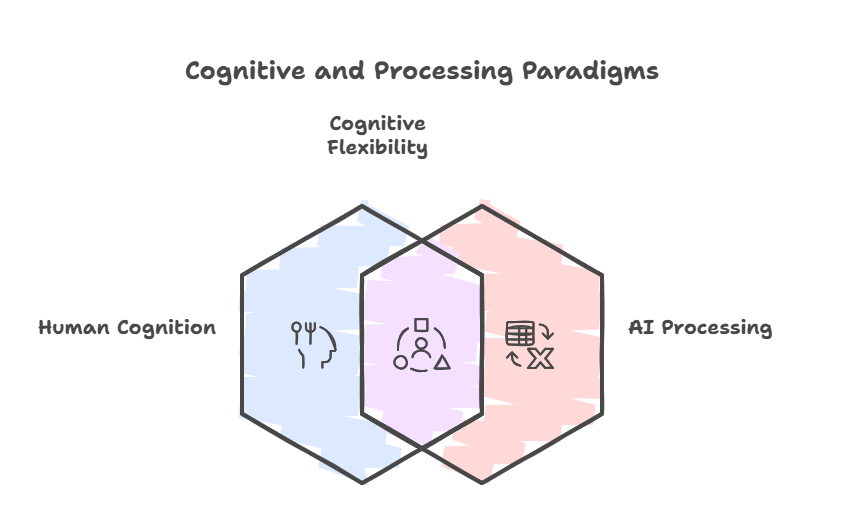
4.2 Decision-Making: Values vs. Optimization
Consider a self-driving car facing an unavoidable accident:
- Human driver: May react instinctively, emotionally
- AI: Runs a cold cost-benefit analysis (minimize total harm)
This exposes AI’s fundamental amorality—it doesn’t care, it computes. Programming ethics into such systems remains an unsolved nightmare.
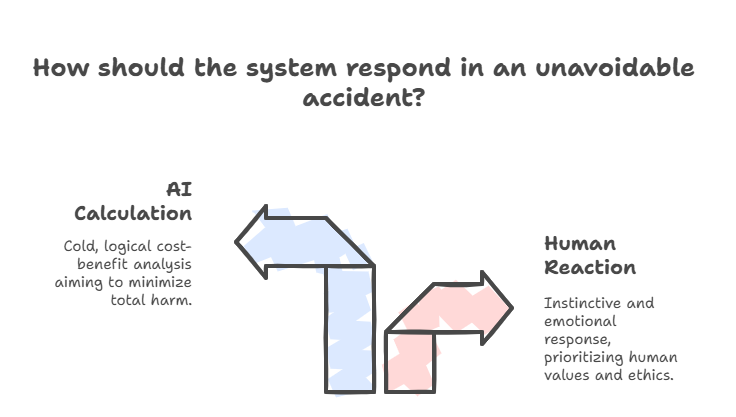
4.3 Creativity: Inspiration vs. Recombination
When humans create:
- Novel ideas emerge from the subconscious blending of experiences
- Emotional states directly influence the output
When AI “creates”:
- Outputs are remixes of training data
- No intentionality, no emotional drive
An AI might generate a beautiful painting—but it doesn’t want to.
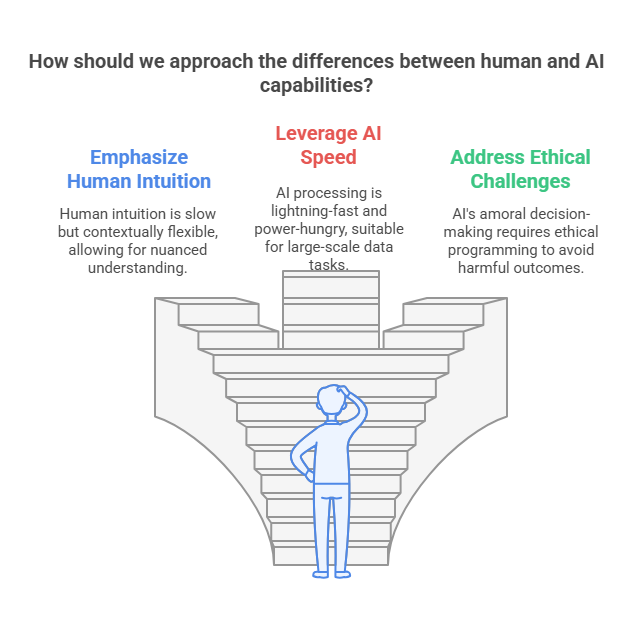
Where Minds and Machines Collide: The Battle for the Future
5.1 Healthcare: The Scalpel and the Algorithm
The hospital of the future will be a battleground between human intuition and machine precision. Consider a diagnostic showdown:
- Human Doctor:
- Spots subtle patient cues (a tremor in the voice, an unnatural pallor)
- Draws on years of tacit knowledge
- Weighs ethical dilemmas (quality of life vs. treatment aggression)
- AI System:
- Processes millions of case studies in seconds
- Never overlook a symptom due to fatigue
- But can’t hold a dying patient’s hand
The irony? The best outcomes emerge when they collaborate. AI flags a rare cancer possibility in a scan that the radiologist might have missed. The doctor then interprets this through the lens of the patient’s unique history—something no AI could fully grasp.
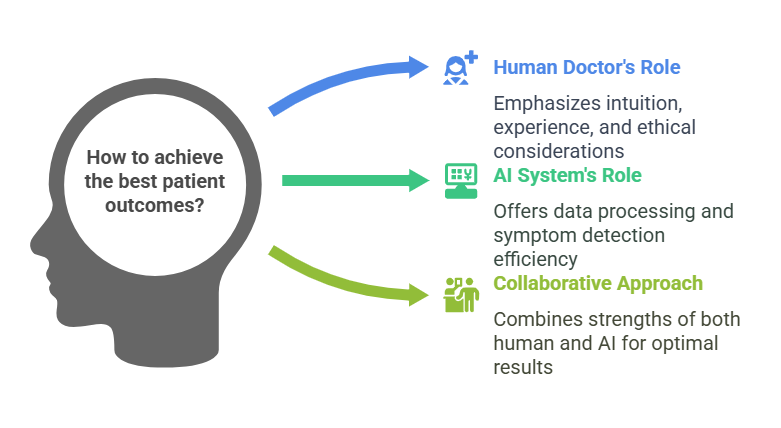
Yet tensions simmer:
“Do we trust an algorithm more than a physician’s decades of experience?”
“When the machine says ‘95% mortality risk,’ do we override human hope?”
5.2 Education: The Mentor vs. The Machine
Classrooms are becoming laboratories for hybrid intelligence.
AI Tutors offer:
✔ 24/7 availability
✔ Infinite patience
✔ Perfect memory of student weaknesses
Human Teachers provide:
✔ Emotional connection
✔ Ability to inspire (“You can do this!”)
✔ Navigating complex social dynamics
The danger? Wealthy districts get both human teachers and AI tools, while underfunded schools are handed chatbots as “cost-effective solutions.” This could widen educational gaps into chasms.
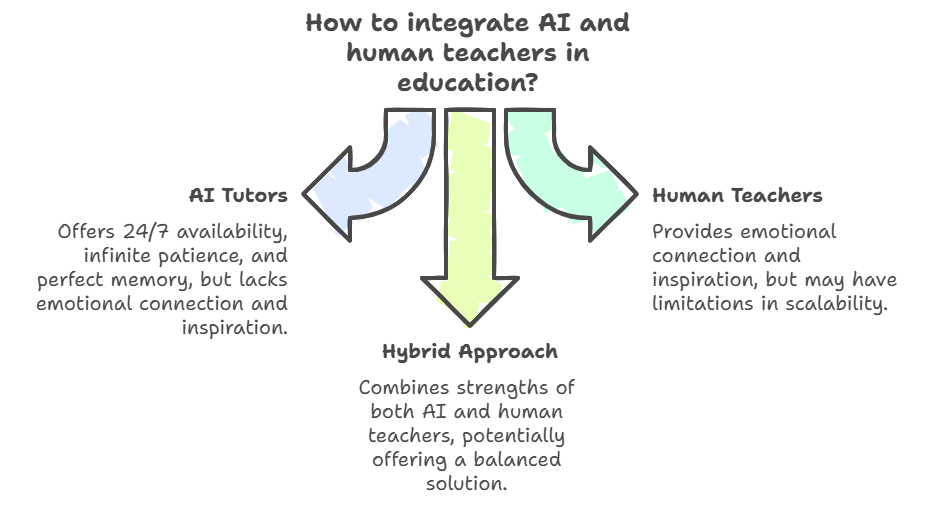
5.3 Business: The Rise of the Cyborg Workforce
Corporate boardrooms now host silent AI participants:
- AI Contributions:
- Predictive analytics (e.g., “This market will crash in Q3”)
- Hyper-personalized marketing
- Real-time fraud detection
- Human Advantages:
- Reading a client’s unspoken hesitations
- Ethical judgment calls
- Creative pivots during crises
The new corporate hierarchy?
- Visionary Humans set strategy
- AI Analysts crunch scenarios
- Hybrid Teams execute
Companies failing to integrate both intelligences risk obsolescence.
The Future: Utopia or Dystopia?
6.1 Augmented Intelligence: The Best of Both Worlds?
The most promising path forward isn’t replacement—it’s symbiosis.
Brain-Computer Interfaces (BCIs) like Neuralink hint at a future where:
- Humans access cloud computation mentally
- AI borrows human contextual understanding
Imagine:
- A surgeon whose hands are guided by AI precision and human judgment
- A writer co-creating with an AI that knows her stylistic preferences intimately
The line between human and machine may blur until it vanishes.
6.2 The Ethical Minefield
Unanswered Questions That Keep Ethicists Awake:
- Bias Amplification
- If an AI is trained on historically biased data, does it perpetuate discrimination?
- Case: Facial recognition failing on darker skin tones
- Autonomous Weapons
- Should a machine ever decide to take a human life?
- The UN debates this as militaries develop AI drones
- Job Apocalypse?
- Oxford studies suggest 47% of jobs could be automated
- But history shows technology often creates new roles
- Artificial Consciousness Rights
- If an AGI claims to be self-aware, do we believe it?
- Does it deserve rights?
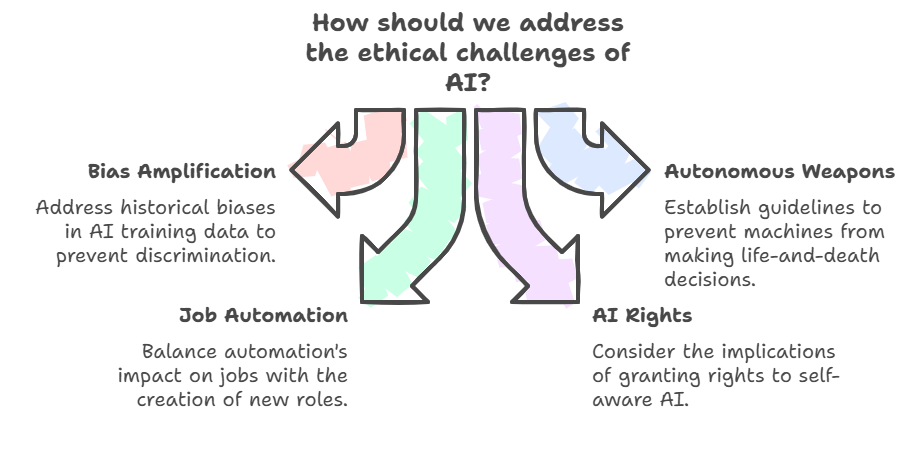
Conclusion: The Intelligence Tango
The dance between humans and artificial intelligence will define this century. Neither can fully replace the other—they’re partners in an uneasy waltz.
The Winning Strategy?
- Let AI handle what it does best (data crunching, repetitive tasks)
- Reserve for humans what makes us unique (ethics, creativity, empathy)
- Build guardrails before crises emerge
The future belongs not to man or machine, but to those who can harness both.
“We’re not creating intelligence—we’re creating a mirror. What it reflects back about humanity may surprise us more than any technological breakthrough.”
Additional Resources:

